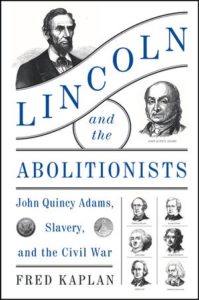Abraham Lincoln: Breaking Down the Myth of a Perfect President
Fred Kaplan on the Antislavery Moralist Who Distrusted Abolitionism
Our 16th president is often either vilified or deified, his great strengths exaggerated, his flaws minimized or disregarded. Since the assassination that transformed him into a martyr, it has been nearly impossible to see Lincoln plain, almost as difficult as Robert Browning remarked it was to see “Shelley plain,” the Romantic poet whose early death had made him a legend rather than a man.
Lincoln was of course born into a world that shaped him. He was not originally a mythologized face on Mount Rushmore, the perfect president who freed the slaves and saved the Union. He was in no rush to free any slaves at all. He believed the slave problem would best be solved by voluntary deportation, known as colonization. One of the legacies of emancipation would, he feared, be a hundred years or more of volatile racism. As a minority president, he found himself backed into a corner by secession, a corner from which he reluctantly took the Union to war to save it. The South started the war to save slavery. The North fought it to keep the Union intact. Like many Americans, Lincoln believed the war would be short. He never imagined it would be as devastatingly long as it turned out to be. The South would, he hoped, relent, or its armies be defeated quickly. Slow to realize no peaceful solution or wartime compromise possible, he stumbled in his choice of strategies, mostly because he misjudged the South, partly because of his ameliorative personality.
Lincoln had no specific plan for postwar reconstruction and national reunification. Whatever he may have attempted if he had lived was likely to have been no more successful, however, than what followed his death. Southern racism was too deeply entrenched ever to have acquiesced in civil rights for blacks without bitter resistance. It’s unlikely that if Lincoln had not been assassinated, America’s racial history would have been a better one. The conflict between state sovereignty and federal authority, differing interpretations of the Constitution, and the belief, deeply embedded in white America’s psyche and laws, that the United States was exclusively a white man’s country would have persisted, regardless of Lincoln’s longevity.
Early in the 19th century, John Quincy Adams, our sixth president, had become convinced that slavery would destroy the Union. Slavery would be ended, he came to believe, only through a civil war. The emancipation schemes his contemporaries proposed, including voluntary immigration of free blacks and emancipated slaves to a nation of their own, seemed to him impractical and unjust. He refused to support the American Colonization Society. Lincoln, who also abhorred slavery as a moral crime, put all his hopes in the Colonization Society. Adams thought it absurd to suppose that free blacks would immigrate voluntarily to Africa or that slave owners would ever cooperate in emancipation. Convinced that slavery would not be the rock against which the nation split, Lincoln believed the South would not succumb to the folly of secession. Adams knew the Southern mind better, having observed its uncompromising, quasi-violent character day after day in Congress from 1833 to 1848. By temperament and willful self-delusion, Lincoln hoped (until the reality was forced upon him) that good sense and the “better angels of our nature” would prevail. Over time, slavery would be eliminated peacefully. Adams never believed that possible. There were no “better angels.”
“One of the legacies of emancipation would, [Lincoln] feared, be a hundred years or more of volatile racism.”
As political philosophers, these two presidents, our most literate, forward-looking statesmen of the 19th century, held similar views about how to guide America toward a prosperous future. Both belonged to the Whig Party that existed from 1832 to 1856. At first a Federalist, then a National Republican, Adams, after 1832, aligned himself with the segment of the National Republicans that morphed into the Whig Party. Yet he always kept his distance from whatever party he had an association with. At heart, he detested parties and party politics. Lincoln was always a party man, at first a Whig and then one of the Republican Party’s leading founding members. Adams worked mostly from the outside, by personality outspoken and a radical; Lincoln from inside, a consensus politician who met his destiny when conciliation was no longer possible. On matters of policy (a national bank, paper money, trade, education, infrastructure, manufacturing, and the proper balance between federal and state power), they were, with the exception of how to deal with slavery, entirely in agreement.
The why and how of that exception illuminate much about Lincoln and the crosscurrents of his life and times. Both Adams and Lincoln were antislavery moralists. Lincoln, unlike Adams, never became an antislavery activist, even when a brutal civil war forced him to take action against slavery. Adams envisioned a multiracial America as inevitable. Long before his death he became deeply sympathetic to abolitionists and abolitionism. Lincoln distrusted abolitionism. Though he believed slavery a moral abomination incompatible with American principles, and looked toward its eventual elimination, he desired that all blacks residing in the United States immigrate to a land of their own. He worried that the attempt of the two races to occupy the same country would lead to a century or more of racial conflict.
Different as they were by background and temperament, Lincoln and Adams had much in common. Both were masters of English prose, Adams in the classical style of the late 18th century into which he had been born, Lincoln in the colloquial style of common speech that became the hallmark of modern American prose. Though they diverged on the issue of antislavery activism, both had an abiding commitment to the dynamic interaction among literature, character formation, and public life. Lincoln and his favorite newspaper, his hometown Sangamo Journal, admired everything about Adams except his outspoken antislavery activism. Abolition and abolitionists were the third rail of national politics for Whig newspapers and politicians.
As a personality and writer, Adams had one foot in the 18th century; Lincoln, one foot in the 21st. In their own time and on slavery and racism, they meet, diverge, and illuminate each other. Surprisingly, on these issues, Adams is more a citizen of the 21st century than Lincoln. Their lives also overlapped. Congressman Lincoln was in the hall of the House of Representatives when, in February 1848, Congressman Adams suffered a fatal stroke. Interweaving their direct and indirect relationship, especially on the most controversial issue of the first half of the 19th century, reveals a dynamic relevant to our past and present. Mutually complementary, Adams and Lincoln, in their differences and similarities, represent the richness of the American experience and the complicated challenge of leading a divided country. They also, together, testify to the long-standing and complicated historical relationship between leadership and moral self-definition.
“In April 1865, in Ford’s Theatre, Lincoln knew that he had saved the Union and ended slavery, but also that the racism underlying slavery was widespread and powerful.”
The achievements of Adams and Lincoln were immense. Yet the praise is better highlighted if the reality is honored. It demeans the man and his situation to simplify Lincoln. He was “the Great Emancipator” in a limited sense only. And by using a historically inaccurate wish fulfillment version of Lincoln, we make the burden heavier on other presidents, including candidates for the presidency in our own time. The mythologized, ahistorical Lincoln is an impossible standard. No one can measure up to it, not even Lincoln. He was a great president, despite his limited vision and his conciliatory politics; despite his inability to embrace some version of abolitionism; despite his fixation on colonization; despite his belief, almost to the end of his life, that America should remain a white man’s country; despite his mistakes as commander in chief, especially his attempt to bribe the South back into the Union and his counterproductive efforts to keep the border states from breaking away; and, most of all, despite his willingness to buy union at the cost of perpetuating slavery indefinitely.
Circumstances beyond Lincoln’s control determined a series of momentous events for him and the nation. They also determined the degree to which he could become an active agent of change. To his immense credit, when faced with disunion, he drew a number of practical and moral lines in the interest of which he was willing to take great risks. The first was the nonextension of slavery into the territories. Abolitionists could, understandably, think this so little as to be almost contemptible. But given who Lincoln was and what he faced politically, it was important enough to have significant consequences. The second was that military force was required to keep the Union intact. Faced with secession, he decided to resupply Fort Sumter, though there was reason to believe the Confederacy would respond with force, initiating armed conflict. And faced with the likelihood that the war would be prolonged excruciatingly or even lost, he at last, in 1863, decided on partial emancipation. And when he finally found the right generals and gave up his efforts to bribe the border states, he also discovered the courage, born of desperation, to commit himself to black manpower to strengthen his army and weaken the Confederacy.
For John Quincy Adams, all this would have seemed a recognition of the inevitable. For abolitionists such as Wendell Phillips, William Lloyd Garrison, Frederick Douglass, and H. Ford Douglas, Lincoln’s journey toward the place they had long occupied seemed painfully slow. That he would not have arrived there had he not been forced by circumstances beyond his control to confront the abyss does not, however, detract from the courage it took to do it. White America had no desire to shed blood or pay money to emancipate slaves. Lincoln had to find ways, halting, difficult, and indirect as they were, to take white America down the road of what became total war and, eventually, total emancipation. At the end, he well knew that this extraordinary accomplishment had left the country with a damaging reality, an almost fatal wound: the difficulty of reconciliation between North and South, between anti-black racism and white America. Eight million bitterly resentful white Southerners would be forced to co-exist with four million ex-slaves whose freedom they deplored and whose liberators they detested.
The result: the failure of reconstruction; the virtual re-enslavement of most Southern blacks; Jim Crow; the civil rights movement; and the still existing post-Civil War hangover of widespread racial prejudice. In April 1865, in Ford’s Theatre, Lincoln knew that he had saved the Union and ended slavery, but also that the racism underlying slavery was widespread and powerful. When he died, he had no solution for this reality, and he knew that his beloved country had entered into a century and more of racial misery. The racism that he feared would dominate black-white relations, white America’s unwillingness to share power with what it believed to be an inferior race, would have characterized the United States even if he had remained president until March 1869: Jim Crow would still have become the new Southern reality; the North would eventually have looked the other way; the white knights of the Ku Klux Klan would have raised their torches as they rode, burning and lynching in the night; the march across the bridge at Selma would have been in America’s future; Ferguson and Dallas still would have happened. The racist alt-right and white nationalist movements would have arisen. I don’t think that this hypothetical Lincoln, melancholy and pessimistic by nature, leaving office after eight wearying years, would have been a happy man. Of course, happiness was not in his nature, but it was not in the historical reality, either.
__________________________________

From Lincoln and the Abolitionists. Used with permission of Harper Perennial. Copyright © 2018 by Fred Kaplan.




















